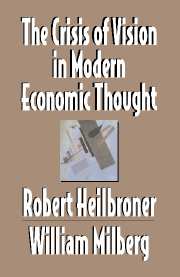7 - The Crisis of Vision
Published online by Cambridge University Press: 21 November 2009
Summary
We must undertake one last task: to indicate the direction in which economic thought must move to regain its relevancy. The previous chapter was a first step toward this end, urging a reawakened awareness of the importance of distinguishing economic inquiry from natural science and, in particular, of the discipline's integral connection with a capitalist order. Now we must attempt the more difficult challenge of spelling out, as specifically as possible, both the nature of the vision and the properties of the analysis most likely to give rise to a new and fruitful classical situation.
Looking to the future always presents its formidable risks, but perhaps we can gain some initial guidance from the broad metahistorical considerations of Chapter 2. There we noted that the history of economic thought, despite the often striking differences from one classical situation to the next, was nonetheless clearly divided into two distinct periods to which we gave the names Political Economy and Economics. The first, we recall, gained its character from the expression of an underlying aristocratic view of society manifested in the class-centered orientation of such otherwise different expositions as those of Smith and Mill. In similar fashion, the second period found its historical distinctiveness in the class-blind democratic political values that permeated classical situations as far apart as those based on Marshall and Keynes.
Can our metahistory serve as a guide for the future of economic thinking? Putting the question in that manner suggests that we are about to urge a return to the visions of Political Economy or Economics, with their associated analytics, to serve as templates for some Third Period to come.
- Type
- Chapter
- Information
- The Crisis of Vision in Modern Economic Thought , pp. 118 - 128Publisher: Cambridge University PressPrint publication year: 1996



